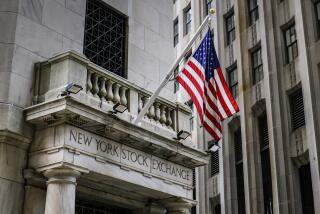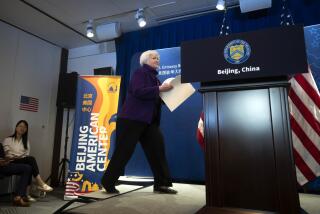Chinaâs Protection of Yuan Has World of Importance
HONG KONG â With stock markets across Asia plummeting anew Monday, battered by the now official Japanese recession that has caused the yen to plunge in value, Chinese leaders find themselves under intense pressure to keep a vow that could drastically affect fortunes in this region, in Southern California and across the rest of the globe: that Beijing will not devalue its currency, the yuan.
But each day, as Asiaâs economic turmoil worsens, that promise gets harder to keep, analysts and officials say.
Indeed, while the yen slid past an exchange rate of 146 to the U.S. dollar Monday--helping to push markets downward in Tokyo, Hong Kong, London, Singapore, Seoul, Paris, Manila and Kuala Lumpur, Malaysia--China has been lauded as âan island of stabilityâ in the region.
In Tokyo today, the plunging yen made an abrupt U-turn, prompting speculation that the Bank of Japan had begun a massive intervention to prop up the currency. The yen soared from 146 to the dollar to as high as 142 before dropping back to trade in the 143.75 range at midday.
âUntil yesterday, the atmosphere was that the yen would go down further, beyond 150 or 160, but if the BOJâs [suspected] intervention today can stop the decline at around 145 or 143, it can be called a success,â said Tetsuo Sugiura, chief economist at Fuji Research Institute.
Beijing has been protecting its currency while those of its neighbors shudder into free fall, making their exports much cheaper than Chinaâs.
But the price of maintaining the value of the yuan is âgetting bigger and bigger,â Central Bank Gov. Dai Xianglong said last week.
Indeed, Dai emphasized the âgreat costâ to China of keeping its word: The country has suffered a sudden drop in exports and in the flow of investment that fuels the growth it needs to carry out massive internal reforms.
Economic growth in China has slipped from 8.8% to 7.2% since last year, according to the government. Foreign analystsâ estimates are even lower.
Beijingâs biggest worry is that radical reforms conceived before the Asian economic crisis erupted could founder if economic growth falls much further.
This comes at a time when millions of Chinese are to be thrown out of work as state-owned enterprises--as part of a three-year plan--are forced to sink or swim without government help. Within five years, under the present Chinese plans, banks must sort out their bad loans, and workers will have to buy their own houses.
âWithout devaluation, China canât reach its objectives,â said Zhu Xiaohua, an official at the giant government-owned conglomerate China Everbright, at a recent economic conference.
*
While the economic effect of keeping the yuan fixed is great, the cost of devaluing it would, however, be even greater: It would almost certainly spark another round of devaluations in Asia, launching the region into what one economist calls a âdeath spiral.â
âWe donât think itâs going to happen,â Adrian Faure, China research director at Merrill Lynch in Hong Kong, said of the prospect of China changing the value of the yuan. âThe external pressures are not strong enough to cause a devaluation.â
Instead, Faure forecasts a gradual, de facto depreciation of the yuan by 7% or 8% over the next 18 months; this could be done by the government allowing certain transactions to occur with discounts or favorable terms for foreign investors.
In the midst of regional turmoil, China has been buffered because its currency is not fully convertible, meaning it is not freely traded in world markets. This also means it is not susceptible to speculative attacks such as those that helped trigger Thailandâs currency crisis.
China still holds a healthy trade balance, despite flagging exports; it also holds huge reserves.
As for Chinese exporters, analysts say their ability to raise trade credit and working capital is more important to them than any adjustment in the exchange rate--which would be offset when competitors were also forced to devalue their currencies.
In the end, the decision to devalue or not is mostly a political one.
China last devalued its currency in 1994, and this was done by unilateral, official edict, with all other aspects of the Chinese economy adjusting accordingly.
But in this crisis, China has made repeated, high-profile pledges to its international trading partners and neighbors to help maintain stability in the region.
If Beijing holds fast, its long-sought entry to the World Trade Organization, with special concessions, is a likely reward. If it is required by internal instability to go back on its word, it will lose great political credibility and reap the blame for further regional turmoil.
Still, there are signs of the Beijing regimeâs discomfort and displeasure at its current situation.
Li Peng, Chinaâs parliamentary chief, made a rare break with diplomatic protocol Monday, urging Japan to stabilize its economy, noting that the yenâs slide had put fresh pressure on Asian economies. Li voiced Chinaâs concern about Tokyoâs economic disorder, Reuters news service said, to a visiting Japanese elder statesman.
The New China News Agency quoted the Chinese strongman as telling Susumu Nikaido, a former Japanese chief Cabinet secretary, that the ârecent continued devaluation of the Japanese yen has imposed a new pressure on the economies in Asia.â
China bristles at outside complaints about its policies as interference in its internal affairs, and top leaders usually leave the role of criticizing foreigners to state-run media.
Liâs comments followed a firestorm of criticism unleashed against the United States and Japan by Chinaâs leading financial dailies Monday. The papers railed against the two countries for failing to halt the yenâs slide, saying they were pursuing their own interests at peril to troubled Asian economies. The state-run newspapers also said Japanese and U.S. inaction had made it hard for China to keep its pledge not to devalue its currency.
In Japan, government interventions over the past six months have succeeded only in propping up the currency and stock markets for a few days or at most a week, but economist Sugiura suggested that market players may be reassured by government promises to take swift action on Japanese banksâ bad-loan problem.
Prime Minister Ryutaro Hashimoto told parliament today, âWe need not only to stimulate domestic demand, but also to aim at a fundamental resolution of the bad-loan issue that has been darkening the economy.â
Taku Yamasaki, a senior Liberal Democratic Party policymaker, went even further, saying today for the first time that the ruling party wants to announce specific measures to deal with the bad-loan problem before parliamentary elections scheduled for July 12. Foreign and Japanese financial analysts have been dubious that the slow-moving LDP would take concrete steps until after the elections.
*
Meantime, Hong Kong too is sticking to its fixed exchange rate, which has been pegged for 15 years at 7.8 Hong Kong dollars to one U.S. dollar. The Hong Kong dollar would probably be hit hard if Beijing weakened the yuan--and investors are hedging their bets.
The New World Group, one of Hong Kongâs biggest investors in China, announced Wednesday that it would start borrowing yuan instead of U.S. dollars to lessen its exposure if China does devalue. The Chinese-owned âred chipâ company Shum Yip Investment Ltd. did the same.
*
Times Tokyo Bureau Chief Sonni Efron contributed to this report.
More to Read
Sign up for Essential California
The most important California stories and recommendations in your inbox every morning.
You may occasionally receive promotional content from the Los Angeles Times.









